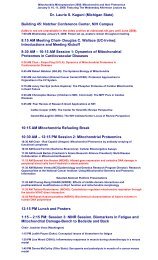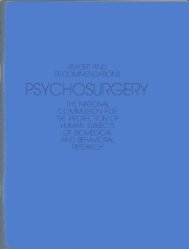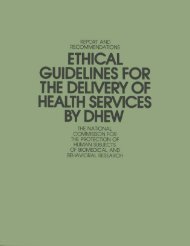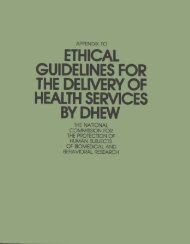RESEARCH ON THE FETUS - National Institutes of Health
RESEARCH ON THE FETUS - National Institutes of Health
RESEARCH ON THE FETUS - National Institutes of Health
Create successful ePaper yourself
Turn your PDF publications into a flip-book with our unique Google optimized e-Paper software.
informed consent and review <strong>of</strong> the research by a committee <strong>of</strong> peers do not constitute<br />
significant barriers. He advocated conducting such reviews locally<br />
rather than in Washington. He expressed a personal distaste for nonbeneficial<br />
research on the aborted fetus, for which an outright prohibition might be considered,<br />
but cautioned that such a course would be unlikely to stop the search<br />
for new knowledge, perhaps in another country or in another generation. He concluded<br />
that knowledge cannot be sequestered nor the course <strong>of</strong> its attainment<br />
blocked, and he suggested that the wiser direction would be adequate regulation<br />
<strong>of</strong> research on the fetus rather than outright prohibition.<br />
26. Norman Kretchmer, M.D. (Director, <strong>National</strong> Institute <strong>of</strong> Child <strong>Health</strong><br />
and Human Development, <strong>National</strong> <strong>Institutes</strong> <strong>of</strong> <strong>Health</strong>). Dr. Kretchmer summarized<br />
the policies and procedures presently in effect at NIH for the protection <strong>of</strong> human<br />
subjects studied in research activities. Proposals involving extramural research<br />
(which is conducted at institutions other than NIH) undergo a three-stage process<br />
<strong>of</strong> review, including: (1) review by the institution proposing the research,<br />
(2) review by scientific peers acting as consultants to NIH, and (3) review by<br />
the <strong>National</strong> Advisory Councils <strong>of</strong> the <strong>Institutes</strong> supporting the projects.<br />
The first stage is performed by an Institutional Review Board (IRB), a<br />
panel consisting <strong>of</strong> members with diverse backgrounds and drawn from various disciplines.<br />
It is the responsibility <strong>of</strong> the IRB to review the proposal for scientific<br />
merit, community acceptability, the balance <strong>of</strong> risks and benefits, and any<br />
other factors that might bear upon the protection <strong>of</strong> the rights and welfare <strong>of</strong><br />
the subjects.<br />
The second stage <strong>of</strong> review is conducted by scientific peers, to evaluate<br />
the soundness <strong>of</strong> the research design, the relevant pr<strong>of</strong>essional experience <strong>of</strong><br />
the investigator, adequacy <strong>of</strong> facilities, scientific importance <strong>of</strong> the research,<br />
and the like. In addition, the reviewing body may consider the investigator's<br />
evaluation <strong>of</strong> risks and benefits, as well as any procedures suggested to protect<br />
the subjects against possible risks.<br />
The final stage <strong>of</strong> review is conducted by a <strong>National</strong> Advisory Council,<br />
a panel composed <strong>of</strong> two-thirds scientists and one-third nonscientists. Their<br />
responsibility is to recommend policy for the Institute and to advise the<br />
49











